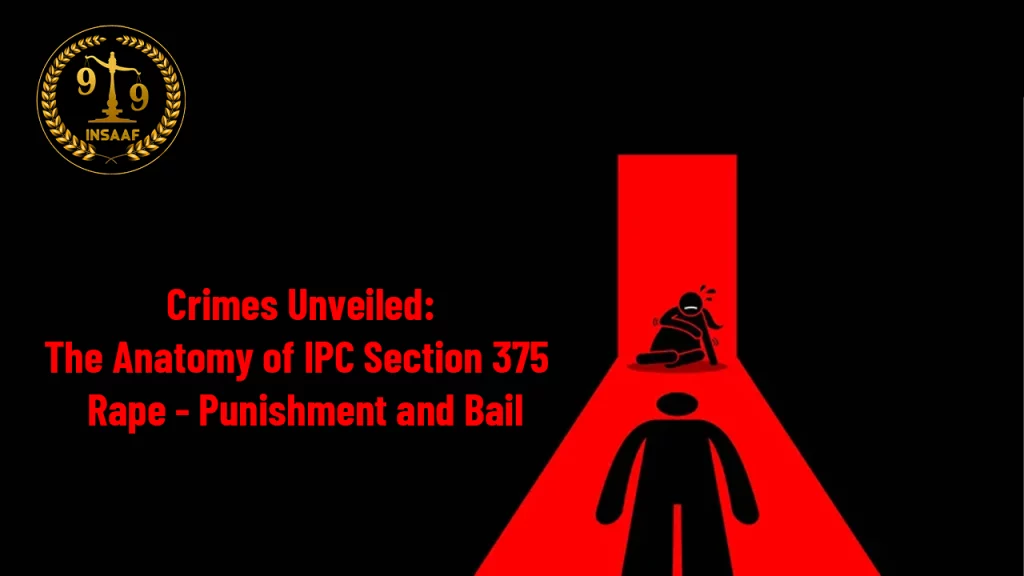

Online Legal Advice from Insaaf99® Online Lawyer Consultation in India


Online Legal Advice from Insaaf99® Online Lawyer Consultation in India

In the legal framework of India, the Indian Penal Code (IPC) assumes a crucial role in delineating and addressing criminal offenses. Within the extensive array of IPC sections, Section 375 holds particular significance as it pertains to a grave crime with profound societal implications - rape. This article seeks to furnish a comprehensive comprehension of IPC Section 375, delving into its stipulations, the prescribed penalties, and the intricacies associated with bail applications in cases of this nature.
IPC Section 375 elucidates the legal parameters surrounding rape in India. As per this section, rape occurs when a man partakes in sexual intercourse with a woman under specific circumstances without her consent. These circumstances encompass situations where consent is procured through force, coercion, deception, or when the woman is incapable of expressing her consent. Furthermore, engaging in sexual acts with a woman below the age of sixteen, regardless of her consent, falls within the purview of rape under Section 375.
Understanding the intricacies of this section is crucial, as it forms the foundation for prosecuting individuals accused of committing the crime of rape.
The gravity of the offense outlined in IPC Section 375 is underscored by the stringent punishment it mandates. The severity of the prescribed punishment is contingent on several factors, including the age of the victim, the relationship between the accused and the victim, and whether the victim endured any physical or mental harm.
Minimum Punishment: Individuals found guilty under Section 375 face a minimum sentence of rigorous imprisonment for a term not less than seven years, extendable up to ten years.
Aggravated Circumstances: In cases involving aggravated circumstances, such as gang rape or rape of a minor below twelve years, the punishment becomes even more severe. The accused may be liable for imprisonment for life or a term that can extend up to twenty years, accompanied by a fine.
It is crucial to note that the courts retain the discretion to impose a higher sentence based on the specific facts and circumstances of each case, ensuring a nuanced approach to justice.
Bail, within the domain of criminal proceedings, entails the temporary release of an accused individual pending trial. In instances involving IPC Section 375, the question of whether to grant or deny bail assumes paramount significance in the legal process. It's crucial to understand the legal nuances and various factors that are considered by courts before considering bail application.
Presumption against Bail: Recognizing the seriousness of rape offenses, there exists a presumption against granting bail to the accused. Courts often underscore the necessity of protecting the victim and ensuring that the accused does not impede the ongoing investigation or intimidate witnesses.
Bail Conditions: In instances where the court is inclined to grant bail, it may impose stringent conditions aimed at safeguarding the interests of the victim and the community. These conditions could encompass surrendering the accused's passport, periodic reporting to the police, or refraining from any contact with the victim or witnesses.
Discretion of the Court: The decision to grant bail is within the discretion of the court, which meticulously evaluates the case's facts, presented evidence, and the potential risks associated with releasing the accused. Factors such as the strength of the prosecution's case, the character of the accused, and the likelihood of the accused evading justice, severity of the offense, the nature of the relationship between the accused and the victim, the possibility of influencing witnesses, and the likelihood of the accused re-offending play pivotal roles in this determination.
Understanding the intricate legal landscape concerning bail in cases governed by Section 375 is undeniably challenging. To effectively navigate these complexities, seeking guidance from a qualified lawyer becomes not just advisable but crucial. A skilled attorney can help you comprehend the available options, construct a robust case for bail. When facing such serious charges, having the right legal advocate by your side is an indispensable asset.

India's sexual offense laws, particularly IPC Section 375, face criticism, calling for vital reforms. Critics highlight the narrow definition of consent, urging a more comprehensive understanding. The laws' gender-specific focus on female victims and male perpetrators neglects other gender identities, prompting demands for inclusive language. Insufficient victim support and protection measures emphasize the need for comprehensive resources, including counseling, legal aid, and witness protection mechanisms, aiming to empower victims and foster a conducive environment for reporting.. Reform discussions intensify, emphasizing inclusivity, victim-centricity, and equitability in the legal framework.
Insaaf99, an online legal consultation platform, revolutionizes assistance in IPC Section 375 cases. Connecting users with expert criminal law attorneys, it ensures confidential consultations, offering a secure space for discussing sensitive matters. The platform provides case evaluations, aiding in strategy planning and empowering individuals to make informed legal decisions. Insaaf99 also focuses on legal education, offering resources to enhance users' understanding of IPC Section 375. In bail proceedings, the platform guides individuals through complexities, helping with application preparation and compliance. Beyond legal support, Insaaf99 fosters a community for emotional well-being, recognizing the holistic nature of challenges in cases involving rape. It stands as a comprehensive resource, combining legal expertise with compassion.
IPC Section 375 is a crucial tool in combatting rape, defining the offense and reflecting society's commitment to addressing it seriously. The associated punishment signifies the gravity of the crime. Judicial considerations of bail highlight the delicate balance between the rights of the accused and the protection of victims and society.